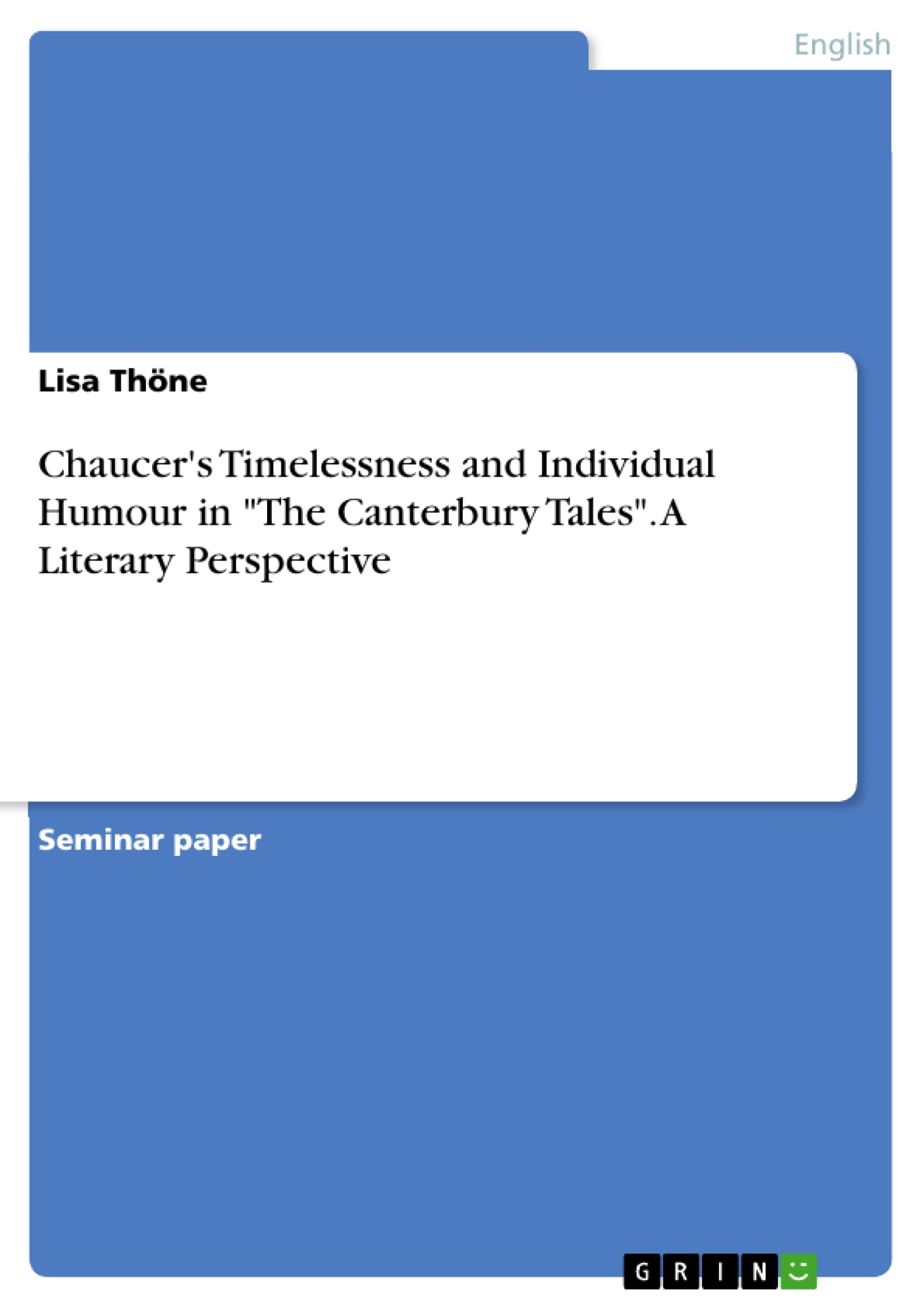This paper analyzes Chaucer's humour in "The Canterbury Tales". The analysis focuses on six tales, exploring different forms of humour and their societal implications, showcasing Chaucer's unique style and critique.
The paper will start by exploring humour at Chaucer’s time as well as Chaucer and his humour in general. After this, a theory by the professor of English Luis Alberto Lázaro Lafuente about Chaucer’s timelessness and especially modernity will be taken into account. In the last part of the Background and Theory Chapter, the most relevant concepts, so forms of humour that are most prominent in Chaucer’s work, and the concept of fable, will be defined. The analysis part will examine six tales that stick out concerning to their scope and variety of humour. First, the miller’s use of dark humour will be focused to then go on to examine how the reeve revenges the miller for that. Then, some prototypical Chaucerian elements of humour in The Canterbury Tales will be investigated to get an understanding of Chaucer’s style and individuality. After this, Chaucer’s critique on humour in The Canterbury Tales will be taken into account. Finally, this paper will arrive at a conclusion, which considers the research question and thesis again, as well as options for further research.
Inhaltsverzeichnis (Table of Contents)
- Introduction
- Background / Theory Chapter
- Humour at Chaucer's Time/Chaucer and his Humour
- Defining some concepts of humour and the concept of fable
- Analysis
- The Miller's Use of Dark Humour in The Canterbury Tales
- The Reeve's Humouristic Revenge on the Miller
- Prototypical Chaucerian Elements of Humour in The Canterbury Tales
- Chaucer's Critique on Humour in The Canterbury Tales
- Conclusion
Zielsetzung und Themenschwerpunkte (Objectives and Key Themes)
This paper examines the use of humor in Geoffrey Chaucer's The Canterbury Tales, specifically focusing on how the diverse humor styles employed by the pilgrims reflect both the timelessness of the work and Chaucer's individualistic approach. The paper analyzes narrative techniques to understand how the pilgrims employ humor, their reactions to it, and how they reflect conventions of the Middle English period. Ultimately, it argues that the breadth and variety of humor in the tales mirror Chaucer's unique style and his challenge to existing social and stylistic norms.
- Humour in the context of the Middle English period
- Chaucer's unique style and departure from literary conventions
- The role of humor in establishing and challenging societal norms
- The individualistic approach of both Chaucer and the pilgrims in their use of humor
- The concept of timelessness in Chaucer's work and its connection to modernity
Zusammenfassung der Kapitel (Chapter Summaries)
The introduction outlines the key themes and questions of the paper, highlighting the importance of understanding how the pilgrims' use of humor reflects both the timelessness of Chaucer's work and his individualistic attitude. It also explores how humor is perceived and interpreted by both the pilgrims and the readers, emphasizing the subjective nature of humor.
The first chapter, "Background/Theory Chapter," explores the context of humor during Chaucer's time. It highlights Chaucer's unique style, his departure from established conventions, and the influence of both French and English humor traditions on his work. The chapter also introduces the concept of the fabliau and explores the theory of humor as a form of communication that can be decoded differently by the writer and the receiver.
The analysis chapter examines six tales in detail, focusing on specific forms and techniques of humor. It explores the use of dark humor by the Miller and the Reeve's humorous response to it, as well as prototypical Chaucerian elements of humor within the context of the tales. The chapter also analyzes Chaucer's critique of humor, highlighting how he uses humor to both entertain and satirize.
Schlüsselwörter (Keywords)
The primary focus of this paper lies in the analysis of the various humor styles found in Geoffrey Chaucer's The Canterbury Tales. Key areas of exploration include the concept of fabliaux, the specific use of dark humor, the individualistic approach to humor by both Chaucer and the pilgrims, and the impact of the time period on the development and perception of humor. Other important keywords include timelessness, modernity, narrative techniques, and social conventions.
- Arbeit zitieren
- Lisa Thöne (Autor:in), 2021, Chaucer's Timelessness and Individual Humour in "The Canterbury Tales". A Literary Perspective, München, GRIN Verlag, https://www.hausarbeiten.de/document/1476989


